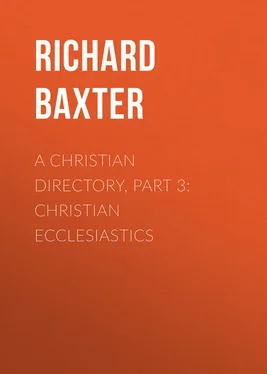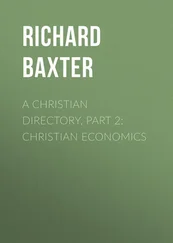Richard Baxter - A Christian Directory, Part 3 - Christian Ecclesiastics
Здесь есть возможность читать онлайн «Richard Baxter - A Christian Directory, Part 3 - Christian Ecclesiastics» — ознакомительный отрывок электронной книги совершенно бесплатно, а после прочтения отрывка купить полную версию. В некоторых случаях можно слушать аудио, скачать через торрент в формате fb2 и присутствует краткое содержание. Жанр: foreign_antique, foreign_prose, на английском языке. Описание произведения, (предисловие) а так же отзывы посетителей доступны на портале библиотеки ЛибКат.
- Название:A Christian Directory, Part 3: Christian Ecclesiastics
- Автор:
- Жанр:
- Год:неизвестен
- ISBN:нет данных
- Рейтинг книги:3 / 5. Голосов: 1
-
Избранное:Добавить в избранное
- Отзывы:
-
Ваша оценка:
- 60
- 1
- 2
- 3
- 4
- 5
A Christian Directory, Part 3: Christian Ecclesiastics: краткое содержание, описание и аннотация
Предлагаем к чтению аннотацию, описание, краткое содержание или предисловие (зависит от того, что написал сам автор книги «A Christian Directory, Part 3: Christian Ecclesiastics»). Если вы не нашли необходимую информацию о книге — напишите в комментариях, мы постараемся отыскать её.
A Christian Directory, Part 3: Christian Ecclesiastics — читать онлайн ознакомительный отрывок
Ниже представлен текст книги, разбитый по страницам. Система сохранения места последней прочитанной страницы, позволяет с удобством читать онлайн бесплатно книгу «A Christian Directory, Part 3: Christian Ecclesiastics», без необходимости каждый раз заново искать на чём Вы остановились. Поставьте закладку, и сможете в любой момент перейти на страницу, на которой закончили чтение.
Интервал:
Закладка:
Direct. III. Differ not in God's worship from the common sense of the most faithful, godly christians, without great suspicion of your own understandings, and a most diligent trial of the case. For if in such practical cases the common sense of the faithful be against you, it is to be suspected that the teaching of God's Spirit is against you; for the Spirit of God doth principally teach his servants in the matter of worship and obedience.
The disadvantages of ungodly men in judging of holy worship.
There are several errors that I am here warning you to avoid: 1. The error of them that rather incline to the judgment of the ungodly multitude, who never knew what it was to worship God in spirit and truth. Consider the great disadvantages of these men to judge aright in such a case. (1.) They must judge them without that teaching of the Spirit, by which things spiritual are to be discerned, 1 Cor. ii. 13, 15. He that is blind in sin must judge of the mysteries of godliness. (2.) They must judge quite contrary to their natures and inclinations, or against the diseased habits of their wills: and if you call a drunkard to judge of the evil of drunkenness, or a whoremonger to judge of the evil of fornication, or a covetous, or a proud, or a passionate man to judge of their several sins, how partial will they be! And so will an ungodly man be in judging of the duties of godliness. You set him to judge of that which he hateth. 3. You set him to judge of that which he is unacquainted with: it is like he never thoroughly studied it; but it is certain he never seriously tried it, nor hath the experience of those, that have long made it a great part of the business of their lives. And would you not sooner take a man's judgment in physic, that hath made it the study and practice of his life, than a sick man's that speaketh against that which he never studied or practised, merely because his own stomach is against it? Or will you not sooner take the judgment of an ancient pilot about navigation, than one's that was never at sea? The difference is as great in this present case.
2. And I speak this also to warn you of another error, that you prefer not the judgment of a sect or party, or some few godly people, against the common sense of the generality of the faithful; for the Spirit of God is likelier to have forsaken a small part of godly people, than the generality, in such particular opinions, which even good men may be forsaken in: or if it be in greater things, it is more unreasonable and more uncharitable for me to suspect that most that seem godly are hypocrites and forsaken of God, than that a party or some few are so.
Direct. IV. Yet do not absolutely give up yourselves to the judgment of any in the worshipping of God, but only use the advice of men in a due subordination to the will of God, and the teaching of Jesus Christ. Otherwise you will set man in the place of God, and will reject Christ in his prophetical office, as much as using co-ordinate mediators is a rejecting him in his priestly office. None must be called master, but in subordination to Christ, because he is our Master, Matt. xxiii. 8-10.
Direct. V. Condemn not all that in others, which you dare not do yourselves; and practise not all that yourselves, which you dare not condemn in others. 19 19 See Rom. xiv. xv; 1 Cor. viii. 13.
For you are more capable of judging in your own cases, and bound to do it with more exactness and diligent inquiry, than in the case of others. Ofttimes a rational doubt may necessitate you to suspend your practice, as your belief or judgment is suspended; when yet it will not allow you to condemn another whose judgment and practice hath no such suspension. Only you may doubt whether he be in the right, as you doubt as to yourself. And yet you may not therefore venture to do all that you dare not condemn in him; for then you must wilfully commit all the sins in the world, which your weakness shall make a doubt or controversy of.
Direct. VI. Offer God no worship that is clearly contrary to his nature and perfections, but such as is suited to him as he is revealed to you in his word. Thus Christ teacheth us, to worship God as he is: and thus God often calleth for holy worship, because he is holy. 20 20 Lev. xix. 2; xx. 7; 1 Pet. i. 16.
1. "God is a Spirit: therefore they that worship him, must worship him in spirit and in truth;" (which Christ opposeth to mere external ceremony or shadows;) "for the Father seeketh such to worship him," John iv. 23, 24. 2. God is incomprehensible, and infinitely distant from us: therefore worship him with admiration, and make not either visible or mental images of him, nor debase him by undue resemblance of him to any of his creatures. 21 21 The second commandment. Cicero de Nat. Deor. lib. i. p. 46, saith, that Possidonius believed that Epicurus thought there was no God, but put a scorn upon him by describing him like a man, idle, careless, &c. which he would not have done if he had thought there was a God.
3. God is omnipresent, and therefore you may every where lift up holy hands to him, 1 Tim. ii. 8. And you must always worship him as in his sight. 4. God is omniscient, and knoweth your hearts, and therefore let your hearts be employed and watched in his worship. 5. God is most wise, and therefore not to be worshipped ludicrously with toys, as children are pleased with to quiet them, but with wise and rational worship. 6. God is most great, and therefore to be worshipped with the greatest reverence and seriousness; and not presumptuously, with a careless mind, or wandering thoughts, or rude expressions. 7. God is most good and gracious, and therefore not to be worshipped with backwardness, unwillingness, and weariness, but with great delight. 8. God is most merciful in Christ, and therefore not to be worshipped despairingly, but in joyful hope. 9. God is true and faithful, and therefore to be worshipped believingly and confidently, and not in distrust and unbelief. 10. God is most holy, and therefore to be worshipped by holy persons, in a holy manner, and not by unholy hearts or lips, nor in a common manner, as if we had to do but with a man. 11. He is the Maker of your souls and bodies, and therefore to be worshipped both with soul and body. 12. He is your Redeemer and Saviour, and therefore to be worshipped by you as sinners in the humble sense of your sin and misery, and as redeemed ones in the thankful sense of his mercy, and all in order to your further cleansing, healing, and recovery. 13. He is your Regenerator and Sanctifier, and therefore to be worshipped not in the confidence of your natural sufficiency, but by the light, and love, and life of the Holy Ghost. 14. He is your absolute Lord, and the Owner of you and all you have, and therefore to be worshipped with the absolute resignation of yourself and all, and honoured with your substance, and not hypocritically, with exceptions and reserves. 15. He is your sovereign King, and therefore to be worshipped according to his laws, with an obedient kind of worship, and not after the traditions of men, nor the will or wisdom of the flesh. 22 22 Matt. xv. 2, 3, 6; Mark vii. 3-14; Col. ii. 8, 18, 22.
16. He is your heavenly Father, and therefore all these holy dispositions should be summed up into the strongest love, and you should run to him with the greatest readiness, and rest in him with the greatest joy, and thirst after the full fruition of him with the greatest of your desires, and press towards him for himself with the most fervent and importunate suits. All these the very being and perfections of God will teach you in his worship: and therefore if any controverted worship be certainly contrary to any of these, it is certainly unwarranted and unacceptable unto God.
Direct. VII. Pretend not to worship God by that which is destructive, or contrary to the ends of worship. For the aptitude of it as a means to its proper end, is essential to it. Now the ends of worship are, 1. The honouring of God. 2. The edifying of ourselves in holiness, and delighting our souls in the contemplation and praises of his perfections. 3. The communicating this knowledge, holiness, and delight to others, and the increase of his actual kingdom in the world. (1.) Avoid then all that pretended worship which dishonoureth God (not in the opinion of carnal men, that judge of him by their own misguided imaginations, but according to the discovery of himself to us in his works and word). Many travellers that have conversed with the soberer heathen and Mahometan nations, tell us, that it is not the least hinderance of their conversion, and cause of their contempt of christianity, to see the christians that live about them, to worship God so ignorantly, irrationally, and childishly, as many of them do. 23 23 But with the barbarous it is otherwise, saith Acosta the Jesuit, p. 249. l. 2. Proderit quam plurimum ritus et signa et omnem externum cultum diligenter curare. His quippe et delectantur et detinentur homines animales (N. B.) donec paulatim aboleatur memoria et gustus præteritorum. So Gr. Nyssen saith in vita Gr. Neocœs. that they turned the pagans' festivals into festivals for the martyrs, to please them the better. Which Beda and many others relate of the practice of those times.
(2.) Affect most that manner of worship ( cæteris paribus ) which tendeth most to your own right information, and holy resolutions and affections, and to bring up your souls into nearer communion and delight in God: and not that which tendeth to deceive, or flatter, or divert you from him, nor to be in your ears as sounding brass, or a tinkling cymbal, or as one that is playing you a lesson of music; and tendeth not to make you better. (3.) Affect not that manner of worship which is an enemy to knowledge, and tendeth to keep up ignorance in the world: such as is a great part of the popish worship, especially their reading the Scriptures to the people in an unknown tongue, and celebrating their public prayers, and praises, and sacraments in an unknown tongue, and their seldom preaching, and then teaching the people to take up with a multitude of toyish ceremonies, instead of knowledge and rational worship. Certainly that which is an enemy to knowledge, is an enemy to all holiness and true obedience, and to the ends of worship, and therefore is no acceptable worshipping of God. (4.) Affect not that pretended worship which is of itself destructive of true holiness: such as is the preaching of false doctrine, not according to godliness, and the opposition and reproaching of a holy life and worship, in the misapplication of true doctrine; and then teaching poor souls to satisfy themselves with their mass, and mass ceremonies, and an image of worship, instead of serious holiness, which is opposed: Prov. xxiv. 24, "He that saith to the wicked, Thou art righteous, him shall the people curse, nations shall abhor him." And if this be done as a worship of God, you may hence judge how acceptable it will be: Isa. v. 20, "Woe unto them that call evil good, and good evil; that put darkness for light, and light for darkness; that put bitter for sweet, and sweet for bitter!" To make people believe that holiness is but hypocrisy, or a needless thing, or that the image of holiness is holiness itself, or that there is no great difference between the godly and ungodly, doth all tend to men's perdition, and to damn men by deceiving them, and to root out holiness from the earth. See Ezek. xxii. 26; xliv. 23; Jer. xv. 19. "If thou take forth the precious from the vile, thou shalt be as my mouth," Mal. iii. 18; Psal. i.; xv. (5.) Affect not a dead and heartless way of worship, which tendeth not to convince and waken the ungodly, nor to make men serious as those that have to do with God.
Интервал:
Закладка:
Похожие книги на «A Christian Directory, Part 3: Christian Ecclesiastics»
Представляем Вашему вниманию похожие книги на «A Christian Directory, Part 3: Christian Ecclesiastics» списком для выбора. Мы отобрали схожую по названию и смыслу литературу в надежде предоставить читателям больше вариантов отыскать новые, интересные, ещё непрочитанные произведения.
Обсуждение, отзывы о книге «A Christian Directory, Part 3: Christian Ecclesiastics» и просто собственные мнения читателей. Оставьте ваши комментарии, напишите, что Вы думаете о произведении, его смысле или главных героях. Укажите что конкретно понравилось, а что нет, и почему Вы так считаете.












